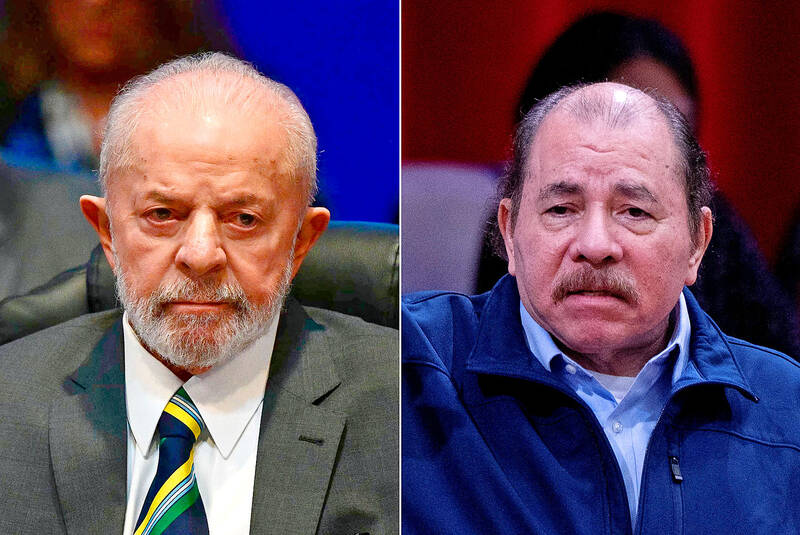Brazil and Nicaragua have expelled each other’s ambassadors in a tit-for-tat diplomatic row, as Brazilian President Luiz Inacio Lula da Silva appears to recalibrate his approach to authoritarian leftist rulers who were once seen as allies.
The dual expulsions this week came amid growing tensions between Lula and another supposedly progressive leader, Venezuelan President Nicolas Maduro, whose claim of re-election the Brazilian president has yet to acknowledge. Lula and his counterparts in Colombia and Mexico have called on Maduro to release voting tallies from all polling stations to support his win.
On Thursday, Brazil announced the expulsion of the Nicaraguan ambassador as an “application of the principle of reciprocity” following Nicaragua’s decision to expel the Brazilian ambassador two weeks ago.

Photo: AFP
Ambassador Breno de Souza da Costa is reported to have refused, under the direction of the Brazilian government, to participate in an event celebrating the 45th anniversary of the Sandinista Revolution, when left-wing revolutionaries overthrew the then-president Anastasio Somoza.
Nicaraguan President Daniel Ortega played a key role in that revolution, but in recent years has overseen an increasingly vicious crackdown on dissent, imprisoning dozens of opposition leaders, including former comrades-in-arms and forcing hundreds of thousands to flee the country.
Nicaraguan Ambassador Fulvia Patricia Castro had only been in the role for three months before she was expelled on Thursday. The same day she was appointed by Nicaraguan vice-president and Ortega’s wife Rosario Murillo as the new minister of family economy.
Brazilian newspaper O Globo said that Brazilian diplomats see Lula’s stance as a strategic move to counter accusations that he has been lenient with Maduro in Venezuela.
Although Brazil has resisted recognizing Maduro’s alleged victory, Lula has faced criticism, particularly from the right, for not following the US, Argentina and other countries in recognizing the opposition candidate Edmundo Gonzalez as Venezuela’s rightful president.
Feliciano de Sa Guimaraes, associate professor of international relations at the University of Sao Paulo, said Lula’s shifting attitude toward Ortega and Maduro reflected the domestic political cost of being seen as supporting two “dictatorships.”
“It’s an adjustment in posture, not a change in posture. It is more about the high domestic cost of being seen close to regimes that are rejected by the Brazilian population,” Guimaraes said.
The relationship between Lula and Ortega, once allies, has been deteriorating for at least a year.
Last year, the Brazilian president responded to a request from Pope Francis and attempted to intervene for the release of Bishop Rolando Jose Alvarez, a critic of Ortega’s authoritarian regime, who was imprisoned on charges of “conspiracy to undermine national integrity and spreading false news.”
The Catholic leader was eventually released in January after more than 500 days in prison, but was forced to leave the country.
Last month, Lula said he had been ignored by Ortega: “The fact is that Daniel Ortega didn’t take my call and didn’t want to speak with me. So, I never spoke to him again, never again,” he said.

Polish presidential candidates offered different visions of Poland and its relations with Ukraine in a televised debate ahead of next week’s run-off, which remains on a knife-edge. During a head-to-head debate lasting two hours, centrist Warsaw Mayor Rafal Trzaskowski, from Polish Prime Minister Donald Tusk’s governing pro-European coalition, faced the Eurosceptic historian Karol Nawrocki, backed by the right-wing populist Law and Justice party (PiS). The two candidates, who qualified for the second round after coming in the top two places in the first vote on Sunday last week, clashed over Poland’s relations with Ukraine, EU policy and the track records of their

UNSCHEDULED VISIT: ‘It’s a very bulky new neighbor, but it will soon go away,’ said Johan Helberg of the 135m container ship that run aground near his house A man in Norway awoke early on Thursday to discover a huge container ship had run aground a stone’s throw from his fjord-side house — and he had slept through the commotion. For an as-yet unknown reason, the 135m NCL Salten sailed up onto shore just meters from Johan Helberg’s house in a fjord near Trondheim in central Norway. Helberg only discovered the unexpected visitor when a panicked neighbor who had rung his doorbell repeatedly to no avail gave up and called him on the phone. “The doorbell rang at a time of day when I don’t like to open,” Helberg told television

‘A THREAT’: Guyanese President Irfan Ali called on Venezuela to follow international court rulings over the region, whose border Guyana says was ratified back in 1899 Misael Zapara said he would vote in Venezuela’s first elections yesterday for the territory of Essequibo, despite living more than 100km away from the oil-rich Guyana-administered region. Both countries lay claim to Essequibo, which makes up two-thirds of Guyana’s territory and is home to 125,000 of its 800,000 citizens. Guyana has administered the region for decades. The centuries-old dispute has intensified since ExxonMobil discovered massive offshore oil deposits a decade ago, giving Guyana the largest crude oil reserves per capita in the world. Venezuela would elect a governor, eight National Assembly deputies and regional councilors in a newly created constituency for the 160,000

North Korea has detained another official over last week’s failed launch of a warship, which damaged the naval destroyer, state media reported yesterday. Pyongyang announced “a serious accident” at Wednesday last week’s launch ceremony, which crushed sections of the bottom of the new destroyer. North Korean leader Kim Jong-un called the mishap a “criminal act caused by absolute carelessness.” Ri Hyong-son, vice department director of the Munitions Industry Department of the Party Central Committee, was summoned and detained on Sunday, the Korean Central News Agency (KCNA) reported. He was “greatly responsible for the occurrence of the serious accident,” it said. Ri is the fourth person